The Master of Education is an in-depth coursework program that allows students to create individual programs to suit their interests and thus shape their own educational pathways. The program is designed to meet the increasing demand for professional development for educators across a diverse range of specialisations.
Students need to refer to the specific admission requirements for some specialisations.
The Master of Education is a 72-unit program offered by the Faculty of Education, Humanities and Law on campus and in distance mode.
Students will be given the opportunity to choose from the following specialisations or to undertake the named Master of Education.
Note that the specialisations marked with * are also available in distance mode.
Students will choose to apply for either the
OR one of the following named specialisations The specialisation will be identified on the student’s transcript of academic record and on the parchment presented to the student on completion of the course.
Admission requirements
Applicants must normally hold an approved degree or equivalent qualification. However, the Faculty Board may, under certain circumstances and subject to specific conditions, admit others who can show evidence of fitness for candidature.
Credit may be granted, on application, for topics completed or being undertaken towards another relevant graduate certificate or masters degree, or for accredited professional development.
In addition to this generic admission requirement, some specialisations in the Master of Education have additional admission criteria, as follows
- The Master of Education (International Baccalaureate) requires that applicants are currently employed in an IB school.
- The Master of Education (Leadership and Management) requires that applicants have not less than two years’ work experience in an organisation.
Course aims
The Master of Education provides students with opportunities to critically examine literature, engage in debate and reflection, and develop in-depth knowledge of
- traditions of thought and analysis used to discuss and illuminate matters of educational policy and practice
- theoretical and practical matters in education in such a way as to improve professional decision making
- the variety of educational research methods and their application
- local and global, social, cultural, political and economic perspectives and practices associated with the education of children, young people and adults
- curriculum, pedagogy, assessment, policies and practices designed to improve learning outcomes and well-being for children, young people and adults
- methods for fostering interdisciplinary and intercultural partnerships and working collaboratively.
Learning outcomes
It is expected that graduates will be able to:
- examine current literature in the field of education with an informed, critical perspective
- critically discuss and evaluate current theory and research in selected areas of educational policy and practice
- translate and apply knowledge gained from reading, discussion, and writing into educational practices
- apply knowledge, skills and capacities to take leadership roles in relevant contexts
- contribute to the informed construction of educational policy and practices.
